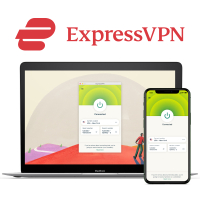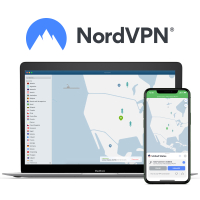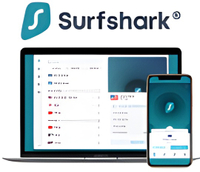The best VPN for Iran
Bypass internet restrictions and geo-blocks in Iran with the best VPNs

A virtual private network (VPN) is an online security and privacy tool that encrypts your internet traffic and routes your data through a secure “tunnel,” thereby anonymizing you on the internet and making it near-impossible for snoopers to track your online activities.
A high-quality VPN is all the more necessary in regions like Iran where the government, to stop dissidents, has resorted to heavy internet censorship, even blocking access to many social media platforms like Instagram, Facebook, and WhatsApp. While Iran allows certain VPNs, they’re all “government-approved” which renders them unreliable. So, if you’re in Iran and want to use a VPN without being punished for it, you need to use an undetectable VPN i.e. a VPN with obfuscated servers.
To find the msot reliable Iran VPNs, TechRadar experts tested multiple providers across parameters like security, server locations, price, and usability. Keep reading to find out what those VPNs are and what factors you should prioritize when choosing a VPN for use in Iran.
The best VPN for Iran in 2025
VPNs protect you online by hiding your internet activities from the prying eyes of hackers, internet service providers, and government authorities. You can also use a VPN to access geo-exclusive content, enhance your gaming experience (it stops DDoS attacks and ISP throttling), and save money on flights, subscriptions, and more.
The best VPN services are a must-have, particularly in Iran, the biggest perpetrator of internet shutdowns in 2023 and a country that heavily restricts independent VPN providers. This is why none of the VPNs that are actually secure for Iranian citizens have servers in the country because that would mean becoming a government-approved provider, and that’s just a fancy way of saying that the VPN service can be used by the authorities to spy on citizens.
So, we’ve picked top-ranking providers with servers in nearby countries. Check out our top three VPN recommendations for privacy-conscious individuals in Iran:
1. ExpressVPN: the best Iran VPN service in 2025
ExpressVPN is our #1 recommendation for Iranian citizens, thanks to servers in nearby countries like Turkey, Pakistan, and Israel—and thousands more spread worldwide. Combine that with rock-solid security, blazing speeds, powerful unblocking capabilities, and easy-to-use apps, and you can see why we rate the service so highly.
A 30-day money-back guarantee will allow you to take the service out for a test ride risk-free—plus you get a password manager, 1 year of unlimited cloud storage, and 3 months of extra protection for free on a 12-month plan subscription.
2. NordVPN: the best all-round VPN for security
NordVPN is an all-in-one security solution that comes with a built-in antivirus, ad-blocking, a password manager, and a world-class VPN with servers in Turkey, Israel, and the UAE—so it’s incredibly secure for use in Iran.
With more servers than rivals ExpressVPN and Surfshark, class-leading unblocking capabilities, and ridiculously high speeds, Nord also tops our list as the best Netflix VPN. You'll even get a 30-day money-back guarantee so that you can try it out risk-free before you commit.
3. Surfshark: the best cheap VPN
A great option for those pinching for pennies, Surfshark delivers excellent value for money—you get hundreds of server locations (it has more servers in Iran’s nearby countries than both ExpressVPN and NordVPN), lightning-fast speeds, and reliable unblocking.
A big selling point is Surfshark’s unlimited simultaneous connections, meaning you can install the app on every one of your devices. Take advantage of Surfshark's 30-day money-back guarantee to see if it’s the right fit for you risk-free.
How to pick a VPN
The most important consideration when shopping for an Iran VPN is obfuscated servers in nearby countries—because no high-quality VPN can have servers in Iran, as the government does not allow that. So, look for a VPN with servers in regions like Turkey, Pakistan, Israel, Saudi Arabia, and the UAE.
At the same time, ensure the VPN has thousands of servers evenly spread across the globe so that you can connect from and to anywhere. This will allow you to bypass geo-blocks and access your favorite region-restricted content.
Speaking of accessing foreign content, if you want to do that, you’re going to need a good streaming VPN, meaning one that boasts powerful unblocking capabilities and fast and reliable connections.
Security cannot be overlooked at any cost. You have to pick a VPN with rock-solid security and privacy—a strict no-logs policy, a reliable kill switch, leak protection, and strong encryption protocols (OpenVPN, WireGuard, IKEv2). A secure VPN will spoof your IP address and hide your internet activities from snoopers, including the Iranian government.
Next, consider the amount you’re willing to shell out for a VPN. Yes, privacy is priceless, but if you cannot get a premium provider (that comes with tons of extras, by the way, such as built-in antivirus and dark web monitoring), we suggest checking out our list of the best cheap VPNs.
You’d also want a VPN that’s easy to use, especially if you’re new to VPNs or not tech-savvy. The simplest VPNs, such as ExpressVPN and Surfshark, come with one-click connect functionalities, tons of helpful guides, and friendly 24/7 support for help on the fly.
How we test VPNs
We test VPNs thoroughly, starting at the provider’s website where we carefully examine its privacy policies, any claims it makes, and if/when it uses tracking cookies. We dig deeper into every single VPN provider's logging policy and RAM contents, even decompile and browse its source code (if we can), to make sure it’s as secure as it says on the tin.
Next, we try to sign up for the service anonymously and download its compatible apps on all compatible platforms, including Windows, Mac, iOS, Android, and Linux. We also conduct testing for specific use cases so that we can recommend the best router VPN, Google Chromebook VPN, Smart TV VPN, and more.
While we’re testing the apps, we evaluate core features such as the kill switch, leak protection, and split tunneling (if it’s available) across various encryption protocols and settings. We test every VPN provider's speeds at least 120 times from two different locations, one in the US and the other in the UK.
Next, to test a VPN’s unblocking capabilities, we try to access region-restricted content from popular streaming services like Netflix, Disney Plus, Amazon Prime Video, and BBC iPlayer, and that too, from three different locations around the world.
If you want to know more about how we test VPNs, check out TechRadar’s VPN testing methodology page.
Using a VPN FAQs
Are VPNs safe?
A VPN that supports the most secure protocols (WireGuard, OpenVPN, and IKEv2), has a clear-cut no-logs policy, uses strong encryption (like AES-256), and offers an unfailing kill switch and leak protection can be considered trustworthy.
While hundreds of VPN providers on the market use exaggerated marketing blurbs without actually offering robust protection, you can bank on TechRadar experts’ (who test VPNs daily!) recommendations on our best VPN page.
Is it legal to use a VPN?
Using a VPN can be legal or illegal depending on your location and what you use the VPN for. For example, while VPNs of all shapes and sizes are completely legal in North and South America, Western Europe, Oceania, and most of the rest of the world, authorities there can still slap you with jail time/fines if you use a VPN service for illegal purposes, such as downloading copyrighted content or bypassing a streaming/game provider’s Ts&Cs.
Countries like China and Russia only allow you to use government-appointed providers, whereas Iraq, North Korea, and Turkmenistan have completely banned all VPNs.
Now, let’s talk about Iran: the Ministry of Transport and Communications (MOTC) in Iran released Draft Law 2.0 in January 2022, banning all VPNs that haven’t been granted express permission by the MOTC.
Those in Iran who fail to abide by this rule can face a minimum of one year and a maximum of three years imprisonment, and/or a fine of up to US$2,500. While the law in question has not yet been passed, there have been reports of Iranian officials stopping civilians, checking their devices, and confiscating those that have a VPN on them.
Are VPNs easy to use?
High-quality VPN services are all generally very easy to set up and use. For example, ExpressVPN comes with an intuitive one-click connect functionality, allowing you to connect once and stay protected at all times—and its proprietary Lightway protocol automatically points you to the best server and encryption for your needs.
Not only that, ExpressVPN also provides easy-to-use apps, an in-depth knowledge hub, and friendly 24/7 support so that you receive prompt help in case you run into an issue.
Get daily insight, inspiration and deals in your inbox
Sign up for breaking news, reviews, opinion, top tech deals, and more.

Olivia joined Tom's Guide in October 2023 as part of the core Future Tech Software team, and is the Commissioning Editor at Tom's Guide. With a background in cybersecurity, Olivia is interested in how VPNs protect users' privacy, and how they improve online safety. She also regularly uses VPNs to make sure they deliver what they promise, and specializes in testing VPNs with streaming sites.


